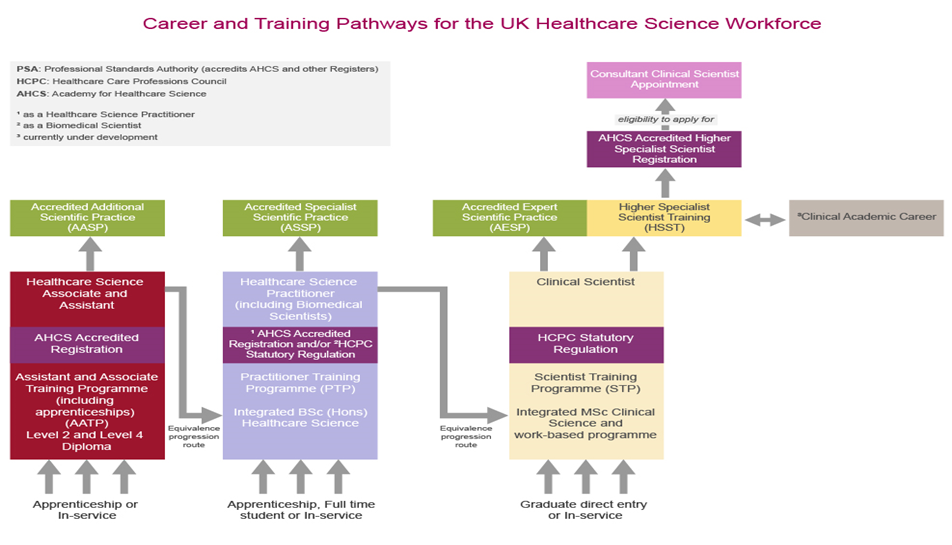
Jane Lynch, STP Training Programme Director for the National School of Healthcare Sciences, provides an update on what's new in the ever-changing world of healthcare science.
The past year has been quite a year, with the challenges of COVID-19 something we’ve never experienced before.
Healthcare scientists (HCS) of all levels have been vitally important – in many specialisms, routine work was paused, and many scientists were redeployed at the height of the first wave, bringing their transferrable skills to support teamwork in intensive care units or taking swabs for COVID testing, and now joining vaccination teams. There have been many reports showcasing the contribution of healthcare science, including the work of clinical engineers to source hundreds of ventilators and train numerous other professions to support use of these, microbiologists implementing large scale testing programmes to confirm a diagnosis of COVID-19, and cardiac scientists/physiologists, along with staff from critical care and respiratory science, providing diagnostics and respiratory support innovatively and embracing the challenges and opportunities for service redevelopment and improvement. As we start to see hope with the roll out of the vaccination problem, we also see that healthcare science has been very visible and recognized by NHS England and Improvement (NHSEI) and Health Education England (HEE), resulting in increased investment in training and education. All of the programmes commissioned directly by the National School of Healthcare Science (NSHCS) have seen increases in the number of funded places for 2021, with a particular focus on cardiac, respiratory and microbiology.
The new Echocardiography Training Programme (ETP) successfully recruited the first cohort of 12 trainees in September 2020. This is an integrated programme - trainees are fully funded for 18 months, allowing them to be completely supernumary and concentrate solely on their echo training. They will take a PGCert in Clinical Echocardiography and at the end of the programme will be ready to complete their BSE TTE Accreditation. We have secured funding to increase the number of places starting in October 2021 and are currently asking for Expressions of Interest from Trusts (closing date 31 March 2021). Routes for both in-service (trainees nominated by their department) and direct-entry (new recruits) will be available. As the training is focused specifically on echo, rather than the much broader curriculum of the STP and with the aim of expanding training capacity, accreditation with the NSHCS is not essential for the ETP. We will be utilising a 'light touch' approach but still providing support to each department in the form of Train the Trainer sessions, Onefile (our eportfolio platform) and other resources. We have purchased some echo simulators which we will have available to loan to departments - studies have shown that the use of simulators can accelerate training, learning how to acquire the appropriate views and to recognize normal and pathological findings, and during the pandemic simulators have been valuable in allowing trainees to continue developing their practical, hands-on skills.
Cardiac science is the second largest specialism within the Scientist Training Programme (STP) (medical physics has the most trainees). Trainees study the same modules for the first 2 years before specializing in either echo and cardiac rhythm management, and the increased funding should boost numbers in both pathways. This has been a difficult year for trainees and for their training officers -maintaining training during a pandemic has been quite a challenge, particularly in the more patient facing roles, but by adapting the completion process and final assessment as well as the recruitment process, the School has enabled trainees to start and to complete on time, maintaining the pipeline of newly qualified clinical scientists.
Higher Specialist Scientific Training (HSST) is an amazing opportunity for scientists working at an advanced level – it is a bespoke Doctoral-level, work-based training programme aimed at developing consultant clinical scientists. It includes modules in high-level scientific and clinical knowledge, leadership and professionalism, and research and innovation.
Applicants to the HSST need to be statutorily registered with the Health and Care Professions Council (HCPC), and in the interests of patient safety and maintaining standards in training, the School strongly supports all healthcare scientists joining a register. There are voluntary registers available with the Registration Council for Clinical Physiologists (RCCP) and the Academy for Healthcare Science (AHCS), with statutory registration as clinical scientists available for those who have completed the STP or can demonstrate equivalence in training and experience. We recently joined with the AHCS to offer funding (for a limited time up to 12th March) to cover the cost of the equivalence process – the response has been very encouraging and we wish everyone applying success in their equivalence process.
We are working hard to increase opportunities in healthcare science at all levels, expanding general healthcare science assistants/associates at Bands 2-4 through new apprenticeships, and also looking at increasing the numbers of physiologists working at practitioner level, particularly those coming into the profession as graduates of related scientific disciplines.

Useful links
National School of Healthcare Sciences
Academy for Healthcare Science
Registration Council for Clinical Physiologists
Health and Care Professions Council